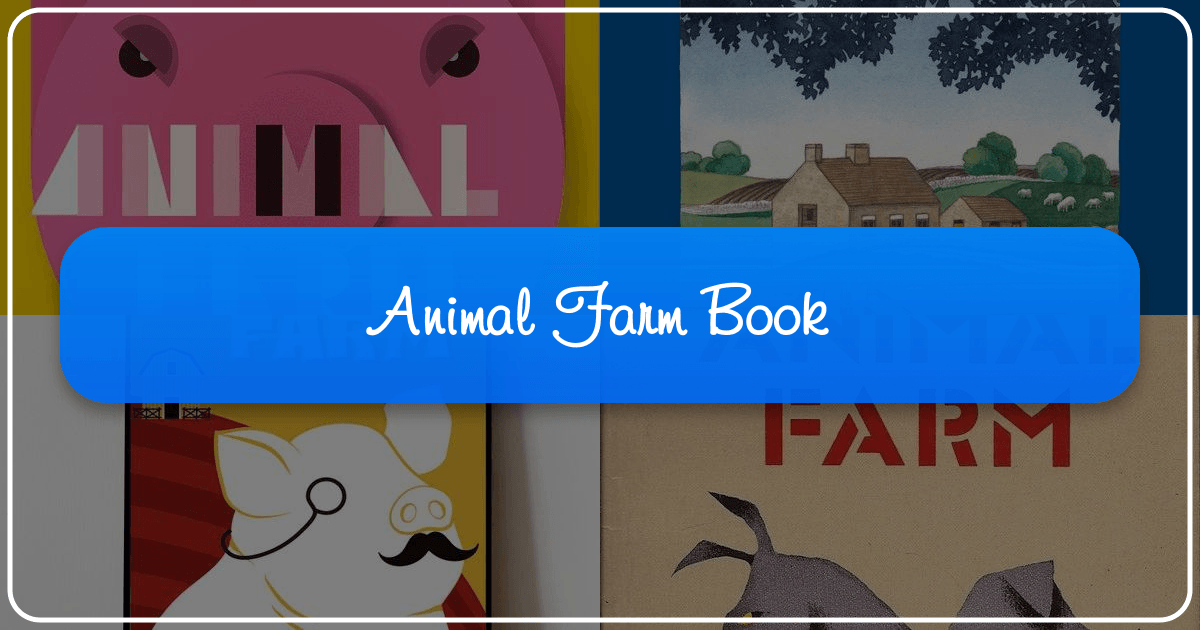Animal Farm Book: A Comprehensive Guide

George Orwell’s Animal Farm, a satirical novella published in 1945, remains a potent and enduring work of literature. Its allegorical narrative, depicting a farm seized by its animal inhabitants who subsequently establish a totalitarian regime, continues to resonate with readers worldwide. This comprehensive guide will explore Animal Farm through various lenses, drawing on the book’s content and aligning with typical website categories dedicated to books and literature.
Genre and Literary Classification
Animal Farm defies easy categorization. While ostensibly a children’s story (as indicated by its subtitle “A Fairy Story”), its complex themes of revolution, power, corruption, and totalitarianism firmly place it within the realms of political satire and allegorical fiction. The novella’s simplicity of language and relatively short length might lead some to classify it as dystopian fiction, although it doesn’t fully embody the characteristics of a dystopia, lacking the detailed societal construction of works like Nineteen Eighty-Four. Its enduring popularity and critical acclaim also firmly establish it as a classic of English literature. The use of animal characters to represent human political figures transforms a seemingly simple narrative into a nuanced exploration of complex political systems, resulting in a timeless relevance and appeal that continues to captivate readers of all ages and backgrounds.

Classics Status and Literary Influence
The work’s position as a literary classic is unquestionable. Its inclusion in countless anthologies and school curricula, coupled with its consistent presence on best-seller lists, testifies to its ongoing relevance. The book’s simple yet powerful prose, along with its allegorical structure, has inspired countless authors, influencing subsequent works of political satire and dystopian fiction. Orwell’s masterful use of allegory allows readers to draw parallels between the animals’ revolution and significant historical events, primarily the Russian Revolution and the Stalinist era of the Soviet Union. This technique makes Animal Farm not only a compelling narrative but also a powerful tool for understanding historical and political dynamics. The book’s lasting influence is further solidified by its frequent adaptation into various media formats, discussed further below.

Author and Writing Style
George Orwell (the pen name of Eric Arthur Blair), a staunch democratic socialist, wrote Animal Farm as a direct response to the horrors of Stalinism. The novella reflects his deep concern with social injustice and his opposition to totalitarian regimes. Orwell’s writing style in Animal Farm is deceptively simple. The narrative employs straightforward language, making the story accessible to a wide range of readers. However, this apparent simplicity belies a deeper complexity. The straightforward language serves to highlight the absurdity of the animals’ self-defeating revolution, and the subtle shifts in language used by the pigs underscore the insidious nature of their manipulation and propaganda. The author’s keen observation of human nature is evident in the way he imbues the animal characters with distinct personalities and motivations, mirroring human flaws and ambitions. Orwell’s wit and irony are pervasive, adding another layer of complexity to the narrative, allowing readers to both engage with the storyline and consider its deeper meaning simultaneously.

Orwell’s Inspirations and Other Works
Orwell’s experiences working with the Imperial Police in Burma, his firsthand observation of poverty in England, and his involvement in the Spanish Civil War deeply influenced his writing. These experiences are reflected in his other works, including Burmese Days, Down and Out in Paris and London, and Homage to Catalonia. Animal Farm however, represents a unique synthesis of his personal experiences and his political convictions, resulting in a masterpiece of allegorical fiction that is at once entertaining and deeply thought-provoking. His other famous work, Nineteen Eighty-Four, further cemented his place as a significant voice in dystopian and political literature. Both works explore themes of totalitarianism and the abuse of power, but Animal Farm offers a more concise and arguably accessible critique, employing a powerful allegorical approach that transcends its specific historical context.
Reading and Learning from Animal Farm
Animal Farm offers significant educational value and imparts profound life lessons. The novella serves as an effective introduction to the concept of allegory, teaching readers to interpret deeper meanings beneath surface narratives. It demonstrates how seemingly straightforward events can carry significant symbolic weight and profound implications.
Educational Value and Life Lessons
On a thematic level, Animal Farm provides invaluable insights into:
- The dangers of unchecked power: The pigs’ gradual seizure of control illustrates how power corrupts, even those with initially noble intentions. This serves as a cautionary tale against the unchecked accumulation of authority and the importance of checks and balances within any system.
- The manipulation of language and propaganda: The pigs’ adept use of propaganda and their distortion of the Seven Commandments highlight the manipulative power of language and its use to control thought and belief. This is particularly relevant in the age of misinformation and the pervasive nature of digital media.
- The importance of critical thinking: The novella encourages readers to question authority and to engage in critical analysis of narratives, urging the reader to look beneath the surface to identify subtle forms of control and manipulation. The continuous modifications to the core principles of Animal Farm underline the importance of actively questioning and challenging established narratives.
- The cyclical nature of history: The ending of Animal Farm, where the pigs become indistinguishable from the humans they originally overthrew, underscores the cyclical nature of history and the potential for revolutionary ideals to be corrupted. This provides a compelling perspective on the patterns of oppression and the inherent fragility of idealistic visions.
The book’s enduring popularity stems from its ability to translate these complex themes into a readily accessible and memorable narrative, utilizing the familiar setting of a farm and engaging animal characters to convey deeper political and social meanings. This accessibility allows for discussion across diverse age groups, making the book suitable for educational purposes across different stages of learning.
Libraries and Archives
Animal Farm is readily available in most libraries worldwide, both in physical and digital formats. It is often found within classic literature collections and is often a key text in secondary school and university libraries. Given its ongoing relevance and its continued discussion as a crucial text in political science and literary studies, it is highly probable that original editions and related archival material are maintained within academic and national archives. Its enduring nature is also highlighted by the extensive availability of e-book versions accessible through digital libraries, ensuring access for a broad readership.
Digital Accessibility and Archival Preservation
Digital libraries like Project Gutenberg offer free electronic editions of Animal Farm, fostering global access to the text and enhancing its educational reach. The preservation of the original manuscripts and editions within physical archives is vital for scholarly research and the study of Orwell’s writing process and historical context. These various forms of accessibility, whether physical or digital, contribute to the ongoing literary relevance and significance of the work, while preserving its literary and historical integrity.
Cultural Impact and Legacy
Animal Farm has had a profound cultural impact. It has been translated into numerous languages and has inspired countless adaptations, including:
- Film adaptations: The novella has been adapted into several animated and live-action films, each bringing unique interpretations to Orwell’s allegorical narrative. These adaptations have contributed to the story’s broad appeal, making it accessible to a diverse audience.
- Stage adaptations: Animal Farm has been adapted for the stage, providing a theatrical experience that further enhances the narrative’s impact.
- Graphic novel adaptations: The visual medium of graphic novels has provided a new perspective on the narrative, showcasing the power of visual storytelling in conveying the themes of oppression and social change.
- Musical adaptations: While less common than other forms of adaptation, the themes of the novella have inspired musical works, exploring the book’s themes through a different artistic medium.
- Educational use and critical analysis: Animal Farm is widely used as an educational tool across various levels, encouraging critical thinking and the study of political science and the literary arts.
Awards and Critical Reception
While Animal Farm may not have received numerous literary awards in the traditional sense, its enduring critical acclaim and constant discussion within the fields of literature and political science speaks to its profound impact on literary and social culture. Its continued presence on best-seller lists and its inclusion in numerous literary anthologies are significant markers of its lasting influence and overall literary success. The various adaptations across different media further underscore the work’s power to transcend the boundaries of its initial publication, making it a keystone of modern literary culture. This enduring critical recognition and adaptation speak to the novella’s powerful narrative and its continued relevance across decades. The critical reception continues to be overwhelmingly positive, making it a required text for numerous curriculums in schools and universities worldwide.
In conclusion, Animal Farm transcends its initial context as a political satire. Its enduring popularity and profound cultural influence stem from its deceptively simple yet powerful narrative, its masterful use of allegory, and the timeless relevance of its themes of power, corruption, and the fragility of revolutionary ideals. The book’s ongoing presence in libraries, archives, and educational settings, along with its continued adaptation into various media, guarantees that George Orwell’s Animal Farm will remain a significant and compelling work of literature for generations to come.